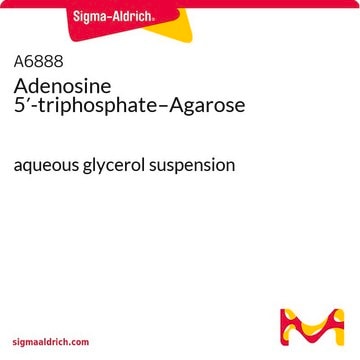A2767
Adenosine 5′-triphosphate–Agarose
lyophilized powder
Synonym(s):
5′-ATP agarose
Sign Into View Organizational & Contract Pricing
All Photos(3)
About This Item
Recommended Products
biological source
plant (Sea weed)
Quality Level
form
lyophilized powder
extent of labeling
1-5 μmol per mL
matrix
cross-linked 4% beaded agarose
matrix activation
cyanogen bromide
matrix attachment
C-8
matrix spacer
9 atoms
storage temp.
−20°C
Looking for similar products? Visit Product Comparison Guide
Related Categories
General description
Adenosine 5′-triphosphate–Agarose (5′-ATP-agarose) is a conjugate of 5′-ATP to crosslinked 4% beaded agarose (activated by cyanogen bromide), via the C-8 atom of 5′-ATP. 5′-ATP–agarose is applicable for affinity purification of various proteins and enzymes like cyclin-dependent kinase 2 (CDK2), heat shock proteins, and cryptochromes.
Application
Adenosine 5′-triphosphate Agarose (5′-ATP agarose) has been used in affinity chromatography to purify uridine kinase from Ehrlich ascites tumor cells.
Adenosine 5′-triphosphate–Agarose (5′-ATP–agarose) is applicable for affinity purification of various proteins and enzymes like cyclin-dependent kinase 2 (CDK2), heat shock proteins-70 (HSP-70), and cryptochromes. 5′-ATP agarose has been used in affinity chromatography to purify uridine kinase from Ehrlich ascites tumor cells.
Physical form
Lyophilized powder stabilized with lactose
Storage Class Code
11 - Combustible Solids
WGK
WGK 3
Flash Point(F)
Not applicable
Flash Point(C)
Not applicable
Personal Protective Equipment
dust mask type N95 (US), Eyeshields, Gloves
Certificates of Analysis (COA)
Search for Certificates of Analysis (COA) by entering the products Lot/Batch Number. Lot and Batch Numbers can be found on a product’s label following the words ‘Lot’ or ‘Batch’.
Already Own This Product?
Find documentation for the products that you have recently purchased in the Document Library.
Customers Also Viewed
C Prodromou et al.
The EMBO journal, 18(3), 754-762 (1999-02-02)
The in vivo function of the heat shock protein 90 (Hsp90) molecular chaperone is dependent on the binding and hydrolysis of ATP, and on interactions with a variety of co-chaperones containing tetratricopeptide repeat (TPR) domains. We have now analysed the
F Geller et al.
Journal of ethnopharmacology, 128(3), 561-566 (2010-02-13)
Preparation from leaves of Cordia americana have been widely used in traditional medicine in South Brazil to treat wounds and various inflammations. The objective of this work was to identify the effective compounds in the ethanolic extract prepared from the
M Brungs et al.
Proceedings of the National Academy of Sciences of the United States of America, 92(1), 107-111 (1995-01-03)
5-Lipoxygenase (5-LO; EC 1.13.11.34) activity in the human monocytic cell line Mono Mac 6 was upregulated by combined treatment with transforming growth factor beta 1 (TGF-beta) and 1,25-dihydroxyvitamin D3 (VD3). In undifferentiated cells, 5-LO enzyme activity was undetectable. After the
Christian Feisst et al.
The Journal of pharmacology and experimental therapeutics, 315(1), 389-396 (2005-07-15)
Myrtucommulone (MC) and semimyrtucommulone (S-MC) are unique oligomeric, nonprenylated acylphloroglucinols contained in the leaves of myrtle (Myrtus communis). Although extracts of myrtle have been traditionally used in folk medicine for the treatment of various disorders, studies addressing select cellular or
C Greiner et al.
British journal of pharmacology, 164(2b), 781-793 (2011-04-22)
5-Lipoxygenase (5-LO) is the key enzyme in the biosynthesis of pro-inflammatory leukotrienes (LTs) representing a potential target for pharmacological intervention with inflammation and allergic disorders. Although many LT synthesis inhibitors are effective in simple in vitro test systems, they frequently
Our team of scientists has experience in all areas of research including Life Science, Material Science, Chemical Synthesis, Chromatography, Analytical and many others.
Contact Technical Service





